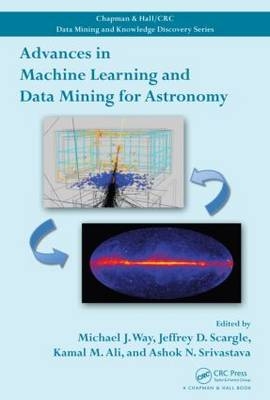
Advances in Machine Learning and Data Mining for Astronomy
Chapman & Hall/CRC (Verlag)
978-1-4398-4173-0 (ISBN)
The book’s introductory part provides context to issues in the astronomical sciences that are also important to health, social, and physical sciences, particularly probabilistic and statistical aspects of classification and cluster analysis. The next part describes a number of astrophysics case studies that leverage a range of machine learning and data mining technologies. In the last part, developers of algorithms and practitioners of machine learning and data mining show how these tools and techniques are used in astronomical applications.
With contributions from leading astronomers and computer scientists, this book is a practical guide to many of the most important developments in machine learning, data mining, and statistics. It explores how these advances can solve current and future problems in astronomy and looks at how they could lead to the creation of entirely new algorithms within the data mining community.
Michael J. Way, PhD, is a research scientist at the NASA Goddard Institute for Space Studies in New York and the NASA Ames Research Center in California. He is also an adjunct professor in the Department of Physics and Astronomy at Hunter College. His research focuses on understanding the multiscale structure of our universe, modeling the atmospheres of exoplanets, and applying kernel methods to new areas in astronomy. Jeffrey D. Scargle, PhD, is an astrophysicist in the Space Science and Astrobiology Division of the NASA Ames Research Center. His main interests encompass the variability of astronomical objects, including the Sun, sources in the Galaxy, and active galactic nuclei; cosmology; plasma astrophysics; planetary detection; and data analysis and statistical methods. Kamal M. Ali, PhD, is a research scientist in machine learning and data mining. He has a consulting practice and is cofounder of the start-up Metric Avenue. He has carried out research at IBM Almaden, Stanford University, Vividence, Yahoo, and TiVo, where he worked on the Tivo Collaborative Filtering Engine. His current research focuses on combining machine learning in conditional random fields with linguistically rich features to make machines better at reading web pages. Ashok N. Srivastava, PhD, is the principal scientist for Data Mining and Systems Health Management and leader of the Intelligent Data Understanding group at NASA Ames Research Center. His research includes the development of data mining algorithms for anomaly detection in massive data streams, kernel methods in machine learning, and text mining algorithms.
Part I Foundational Issues. Part II Astronomical Applications: Source Identification. Classification. Signal Processing (Time-Series) Analysis. The Largest Data Sets. Part III Machine Learning Methods. Index.
| Erscheint lt. Verlag | 26.4.2012 |
|---|---|
| Reihe/Serie | Chapman & Hall/CRC Data Mining and Knowledge Discovery Series |
| Zusatzinfo | 15 Tables, black and white; 33 Illustrations, color; 177 Illustrations, black and white |
| Sprache | englisch |
| Maße | 178 x 254 mm |
| Gewicht | 1564 g |
| Themenwelt | Informatik ► Datenbanken ► Data Warehouse / Data Mining |
| Informatik ► Theorie / Studium ► Künstliche Intelligenz / Robotik | |
| Naturwissenschaften ► Biologie | |
| Naturwissenschaften ► Physik / Astronomie ► Astronomie / Astrophysik | |
| ISBN-10 | 1-4398-4173-X / 143984173X |
| ISBN-13 | 978-1-4398-4173-0 / 9781439841730 |
| Zustand | Neuware |
| Informationen gemäß Produktsicherheitsverordnung (GPSR) | |
| Haben Sie eine Frage zum Produkt? |
aus dem Bereich


